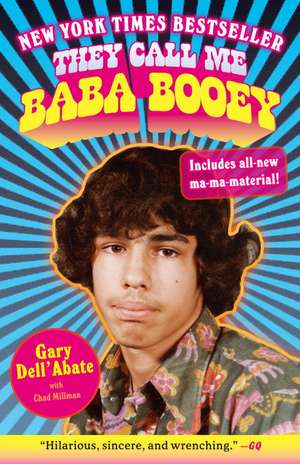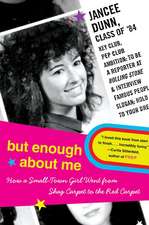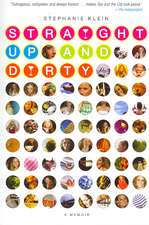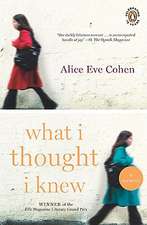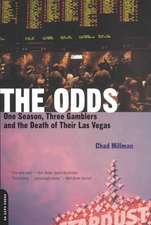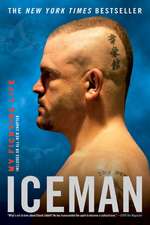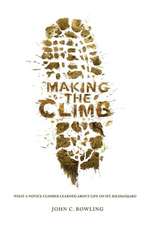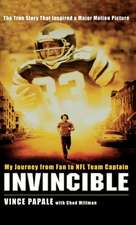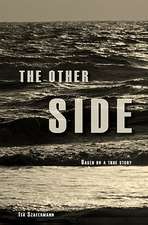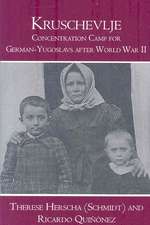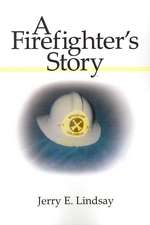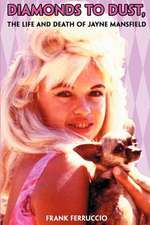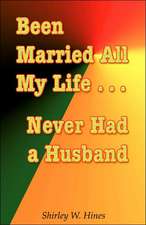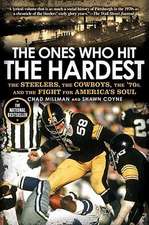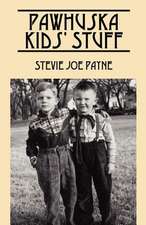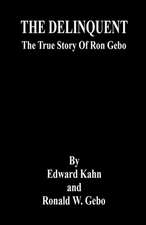They Call Me Baba Booey
Autor Gary Dell'Abate Chad Millmanen Limba Engleză Paperback – 30 apr 2011
Includes all-new ma-ma-material!
ALL NEW CHAPTER:
Baba Booey’s Afghanistan Journal!
and . . . the Shvoogie Buzzer story!
One of pop culture’s great enduring unsung heroes: Gary Dell’Abate, Howard Stern Show producer, miracle worker, professional good sport, and servant to the King of All Media, tells the story of his early years and reveals how his chaotic childhood and early obsessions prepared him for life at the center of the greatest show on earth.
Baba Booey! Baba Booey! It was a slip of the tongue—that unfortunately was heard by a few million listeners—but in that split second a nickname, a persona, a rallying cry, and a phenomenon was born. Some would say it was the moment Gary Dell’Abate, the long-suffering heroic producer of The Howard Stern Show, for better or worse, finally came into his own. In They Call Me Baba Booey, Dell’Abate explains how his early life was the perfect training ground for the day-to-day chaos that comes with producing the most popular radio show on earth.
Growing up on Long Island in the 1970s, the youngest of three boys born to a clinically depressed mother, Gary learned how to fend for himself when under attack. Obsessed with music, he listened with religious intensity to Casey Kasem's Top 40 every Sunday morning, compulsively bought 45s of his favorite songs, and nerdily copied the lyrics into a notebook. Music became an ordering principle to his life, even as the chaos at home got out of hand. Dell’Abate’s memoir sketches the trajectory from the obsessive pop-music trivia buff to the man in the beekeeper’s mask who handily defeats his opponents playing “Stump the Booey.” We learn about the memorable moments in his life that taught him to endure epic bouts of humiliation and get his unique perspective on some of his favorite Stern show episodes—such as the day he nearly killed the Mets mascot while throwing out the first pitch, or the time his mother called Howard’s mother and demanded an apology.
Hilarious, painful, and eye-opening, it’s Gary as you’ve never seen him before, telling a story that even Stern show insiders can’t begin to imagine.
Preț: 97.74 lei
Nou
Puncte Express: 147
Preț estimativ în valută:
18.70€ • 19.67$ • 15.45£
18.70€ • 19.67$ • 15.45£
Carte disponibilă
Livrare economică 27 martie-10 aprilie
Preluare comenzi: 021 569.72.76
Specificații
ISBN-13: 9780812981896
ISBN-10: 0812981898
Pagini: 302
Ilustrații: 16-PP COLOR PHOTO INSERT
Dimensiuni: 133 x 204 x 19 mm
Greutate: 0.27 kg
Editura: Spiegel & Grau
ISBN-10: 0812981898
Pagini: 302
Ilustrații: 16-PP COLOR PHOTO INSERT
Dimensiuni: 133 x 204 x 19 mm
Greutate: 0.27 kg
Editura: Spiegel & Grau
Extras
Chapter 1
I stood on the avocado green carpet of my living room in Uniondale, Long Island. My mom, Ellen, walked out of her bedroom, carrying an overnight bag she had just packed. Our house was a one-story ranch, and I watched her as she inched down the hall toward the living room.
She stopped just a few steps from me and bent down, practically kneeling on the carpet in her dress. She always cared about how she looked, no matter where she was going. "Come here," she told me. I was five years old and she wanted to tell me something face-to-face. I walked closer. She hugged me and said, "Mommy isn't feeling very well. I have to go away for a couple of days."
I knew she cried a lot. I knew she screamed a lot. And I knew people didn't do those things unless something was wrong. I thought she was physically sick and going to a hospital to get better.
My older brothers, Anthony, who was thirteen, and Steven, who was eleven, stood next to her. They knew what was really happening. So did my aunt Maryann, who had come over to watch us that afternoon.
When my mom let go of me she stood up, smoothed down her dress, picked up her bag, and followed my dad, Sal, out the front door. They were headed for the psych ward at Syosset Hospital.
My parents met in 1947 at Webster Hall, a dance place in Manhattan. He was twenty-two from Little Italy; she was twenty and from Bensonhurst, in Brooklyn. "He walked up to me and asked me to dance," my mom once told me. "I told him, 'I heard about all you fellas from Manhattan. You're all a bunch of gangsters.' And he said, 'Yeah, I checked my gun at the bar.' I thought, how sarcastic. That intrigued me.
"My friend Anne thought he was so cute-he reminded her of Humphrey Bogart. He had on a pin-striped suit and really did look like Bogart."
My mom was stylish, had a big smile, and loved mugging for a crowd or a camera. In every picture I have ever seen of her, from when she was young to today, she looks happy. There was never any sign in her eyes of the trouble behind them. On Saturdays when I was growing up, she'd spend three hours at the beauty parlor getting her hair colored and cut and then would sit with rollers in her hair under one of those huge dryers. She even had a cape and a hat that made her look just like Marlo Thomas in the opening credits for That Girl. She always liked to keep up appearances.
That was true when she was growing up in Bensonhurst, too. Her parents came to America from Sicily and Reggio Calabria when they were both kids. They met in Brooklyn and had seven children over fifteen years. The oldest one, Aunt Josie, was nicknamed the General, because she did a lot of the child rearing. My grandmother worked as a seamstress and my grandfather was a construction worker (my aunts and uncles say he helped build the Empire State Building, but I think people say that about every construction worker from back then). My mom was the baby of the Cotroneo clan. The whole family lived together in a multifamily apartment building my grandfather owned.
But my mother didn't grow up rich. My mom likes to tell the story about how she wore nothing but hand-me-downs and had to put cardboard in her shoes because the soles had holes in them. She worked at Macy's while in high school and she'd bring her check home and hand it over to her mother, who cashed it and took all the money, except for a couple of bucks she kicked back to my mother.
None of the Cotroneos moved out of the building until long after they were married. Newlywed kids lived in one of the building's apartments until they could save enough money to buy a place of their own. Of course, most of them didn't move very far away. I had an uncle who moved to Los Angeles and an aunt who lived near us in Uniondale. Everyone else settled within a quarter mile of each other in Bensonhurst. Growing up we went to Brooklyn at least a couple of Sundays every month for huge Italian family dinners, the kind that began at three in the afternoon and started with three or four kinds of pasta piled with different meat sauces. That's when my aunt Angie, who probably never set foot outside Brooklyn, used to say to us, "Brooklyn is the best place in the world. I don't know why anyone would want to live anywhere else."
As close as they were, my mom's family loved arguing. It was like they couldn't stand to be too far away and then couldn't stand the sight of each other. Chaos reigned at those family meals. My father called them the Fighting Cotroneos.
His family was different. He grew up in a railroad flat in Little Italy, on the corner of Mott and Hester. His family was quieter and a little sadder. When my dad was small-"Too small to remember all the details," he once told me-he had a one-year-old brother who died from a throat infection. The funeral was held in his parents' apartment.
My dad was always in great shape and kind of looked like a low-level hood. There's a great picture of him and my mom from their wedding in 1951. They both have ink black hair-hers is down to her shoulders and his is slicked black. He's got on a double-breasted black tuxedo with a white tie-he was a dead ringer for Yankees shortstop Phil Rizzuto. They were both rail thin, but my dad had butcher's hands. Thick and strong.
He wasn't afraid of a fight, either. There was always tension with the Chinese where he lived because Chinatown and Little Italy are basically right on top of each other. One night he got into a fight with a kid from across Canal Street-which separates the two neighborhoods-and beat the crap out of him. A week later my dad saw the kid again, only this time he was in the back of a police car, pointing at him. Two cops got out, picked my dad up, and arrested him. He ended up spending the night at the Tombs, which is what they called the jail in lower Manhattan. It deserved the nickname.
My dad was pretty smart. A junior high teacher recommended him for Stuyvesant High School, one of New York City's top public schools. "But I was always goofing around with kids in my neighborhood, so I dropped out. Never graduated. You weren't supposed to know that," my dad once told me when I interviewed him for a family history video.
He wasn't a thug-but he lived on the periphery of the mob that ran Little Italy. And he liked to gamble. Even though he grew up on the Lower East Side, my dad loved the Brooklyn Dodgers. In 1951, when Bobby Thomson of the New York Giants hit a game-winning home run to beat the Dodgers for the National League pennant, my dad lost a shitload of money. He was listening to the game on the roof of his building and was so upset he threw the radio over the edge.
Years later, I was signing autographs at an event and Giants hero Thomson was there, too, right next to me. I told him that story so he signed a picture for my father, which read, "To Sal, Sorry about the radio, Bobby Thomson."
My dad knew enough about gambling and the guys running the rackets in his neighborhood to know it wasn't the life for him. When World War II started he had just dropped out of high school so he decided to join the army. For more than a year he moved through the United States, training at Fort Dix in New Jersey, then in Illinois, and finally in Hawaii, "for jungle training," he said. When he finally shipped out to fight in the Pacific he thought he was headed for the Yap Islands, but the officers on the ship announced that plans had changed. They were headed for the Philippines.
My mother later told me that when the two of them went to see Saving Private Ryan it was harrowing; it put my dad right back in the war. He was seventeen when he landed in the Philippines. Unreal. When I was seventeen I was reading album liner notes trying to figure out who played horns on a Bob Seger record. My dad told me, "It was just like that movie. Guys were puking as they bounced around the waves. Then the front of the boat comes down and we run into the water and it's just every man for himself, guys were being killed right next to me on the beach."
He spent his war on the front lines as a medic, even though he hadn't even graduated from high school. It didn't matter. He wasn't doing battlefield surgery. His job was to patch someone together quick so they could stay alive long enough to get attention from the real doctors. Medics didn't have the option of ignoring it when one of their guys was screaming. No matter how bad the gunfire, they had to get low and go. And they were constantly under attack. "Banzai attacks," my father called them. They happened at night. "You don't hear them. It was hand-to-hand combat with bayonets. Every hill, every village was a battle."
There was one firefight he remembered that went on for two straight nights. They were under heavy attack, and my dad was in a foxhole when he heard someone yelling, "Medic! Medic!"
"We were dug in and the Japs were dug in and we were shooting at each other," he said. "Our men were hurt in the middle of no-man's-land and the officer called for me. I crawled out there, bandaged them up, gave them sulfur, and dragged one guy back at a time. I couldn't stand up because fire was coming constantly. It's all luck, who lives."
For that he earned a Bronze Star. Not that he wanted to discuss it. Ever. I remember when John Kerry was running for president my dad saw him on TV and said, "I don't like that guy." I asked him why and he said, "Because he's always talking about his medals." This was when the Republicans were claiming Kerry hadn't earned his Vietnam honors. I said, "Dad, he's being attacked. I thought if anyone would be on his side it would be you." But my dad said, "I don't care. You don't talk about it. Talking about it is wrong."
Later in the war, while in Okinawa, my father's unit was under fire and an artillery shell exploded above his head. A piece of shrapnel pierced his backpack and became embedded next to his lung. They shipped him out to a hospital, performed surgery, let him recover for a month, and then shipped him back to the front lines. "As they were giving us new weapons and clothes for a major offensive, we got word that Truman had dropped the bomb. The war was over. Two weeks later I came home."
I once asked my dad if he'd ever killed anyone and he ignored the question. But my older brother Anthony claims that, before my father died, he confessed to doing some bad things over there.
When he came home he hustled, delivering coffee around Manhattan, polishing costume jewelry, working as a proofreader for a publishing company. He was a young guy on the make. And my mom was a young woman with a little bit of sass. When I think of them courting each other I envision the movie Goodfellas, particularly the scenes in the nightclubs. My parents always used to talk about going to the Copa. I also hear my mom imitating her mother, who called my dad "the Mott Street gambler."
"When he would be coming over my mother didn't even say his name," my mom told me. "She just said, 'Is Mott Street coming over?' "
It wasn't that my grandma didn't like him. She was just wary of guys who dressed like gangsters, lived in the city, and courted her daughter. Still, that didn't stop my parents from getting married at a Coney Island Italian restaurant called Villa Joe's, in front of one hundred friends and family.
Naturally, after their weeklong honeymoon in Miami, they moved into an apartment in the Cotroneos' building in Bensonhurst. Their life together seemed like the beginning of their own American dream. "Back then," my father once told me, "your mom was normal."
The night after my mom went into the hospital, my dad and I took a ride to the Syosset psych ward. I was five, too young to visit her there, but my brothers weren't, and they had spent the afternoon with her. It was time for them to come home, and my dad thought the car ride would be a good opportunity to explain what was going on.
He never talked to me like I was a kid. I try to talk to my kids the same way-honestly. There were plenty of times when, after my mom experienced a screaming fit or broke down in tears, he told me I hadn't done anything wrong, that it wasn't my fault Mom was upset. And he made sure I understood it wasn't his fault, either.
Syosset Hospital was twenty-five minutes from our house. While driving, my dad said to me, "Your mom is sick. But not the regular kind of sick."
"What does that mean?" I asked.
"Her brain his sick," he answered. "And when she acts sad or angry it isn't her fault. She doesn't want to be like this." That sounded good to me. I knew enough to think that doctors made people better.
The hospital was a big, gray, stone building that was six stories high, tall for Long Island. We pulled into a circular driveway that was surrounded by flowers and then walked into the first-floor lobby, which was bustling with people. To a five-year-old, it was a fantastic place. The walls were painted a bright yellow; there was a gift shop and couches to play on and a vending machine in the corner. It wasn't a mental institution. It was exciting. And it was where my mother was, so it was where I wanted to be.
The door to the psych ward happened to be directly off the main lobby, and the entry was always protected by a security guard, who looked like he was defending Fort Knox. That's because it wasn't just a regular door, but something heavy that moved back and forth with wires and cables. You had to push a button that opened it. My father worked in the ice cream business-first as a deliveryman and then in sales-and I had been to his office in the Bronx. It had a blast freezer that was kept at 40 degrees below zero to store inventory. I loved that the door to my mom's room at the hospital looked just like the one at the ice cream factory. As I got older, I realized it also looked like the last line of defense in a cell block.
From the Hardcover edition.
I stood on the avocado green carpet of my living room in Uniondale, Long Island. My mom, Ellen, walked out of her bedroom, carrying an overnight bag she had just packed. Our house was a one-story ranch, and I watched her as she inched down the hall toward the living room.
She stopped just a few steps from me and bent down, practically kneeling on the carpet in her dress. She always cared about how she looked, no matter where she was going. "Come here," she told me. I was five years old and she wanted to tell me something face-to-face. I walked closer. She hugged me and said, "Mommy isn't feeling very well. I have to go away for a couple of days."
I knew she cried a lot. I knew she screamed a lot. And I knew people didn't do those things unless something was wrong. I thought she was physically sick and going to a hospital to get better.
My older brothers, Anthony, who was thirteen, and Steven, who was eleven, stood next to her. They knew what was really happening. So did my aunt Maryann, who had come over to watch us that afternoon.
When my mom let go of me she stood up, smoothed down her dress, picked up her bag, and followed my dad, Sal, out the front door. They were headed for the psych ward at Syosset Hospital.
My parents met in 1947 at Webster Hall, a dance place in Manhattan. He was twenty-two from Little Italy; she was twenty and from Bensonhurst, in Brooklyn. "He walked up to me and asked me to dance," my mom once told me. "I told him, 'I heard about all you fellas from Manhattan. You're all a bunch of gangsters.' And he said, 'Yeah, I checked my gun at the bar.' I thought, how sarcastic. That intrigued me.
"My friend Anne thought he was so cute-he reminded her of Humphrey Bogart. He had on a pin-striped suit and really did look like Bogart."
My mom was stylish, had a big smile, and loved mugging for a crowd or a camera. In every picture I have ever seen of her, from when she was young to today, she looks happy. There was never any sign in her eyes of the trouble behind them. On Saturdays when I was growing up, she'd spend three hours at the beauty parlor getting her hair colored and cut and then would sit with rollers in her hair under one of those huge dryers. She even had a cape and a hat that made her look just like Marlo Thomas in the opening credits for That Girl. She always liked to keep up appearances.
That was true when she was growing up in Bensonhurst, too. Her parents came to America from Sicily and Reggio Calabria when they were both kids. They met in Brooklyn and had seven children over fifteen years. The oldest one, Aunt Josie, was nicknamed the General, because she did a lot of the child rearing. My grandmother worked as a seamstress and my grandfather was a construction worker (my aunts and uncles say he helped build the Empire State Building, but I think people say that about every construction worker from back then). My mom was the baby of the Cotroneo clan. The whole family lived together in a multifamily apartment building my grandfather owned.
But my mother didn't grow up rich. My mom likes to tell the story about how she wore nothing but hand-me-downs and had to put cardboard in her shoes because the soles had holes in them. She worked at Macy's while in high school and she'd bring her check home and hand it over to her mother, who cashed it and took all the money, except for a couple of bucks she kicked back to my mother.
None of the Cotroneos moved out of the building until long after they were married. Newlywed kids lived in one of the building's apartments until they could save enough money to buy a place of their own. Of course, most of them didn't move very far away. I had an uncle who moved to Los Angeles and an aunt who lived near us in Uniondale. Everyone else settled within a quarter mile of each other in Bensonhurst. Growing up we went to Brooklyn at least a couple of Sundays every month for huge Italian family dinners, the kind that began at three in the afternoon and started with three or four kinds of pasta piled with different meat sauces. That's when my aunt Angie, who probably never set foot outside Brooklyn, used to say to us, "Brooklyn is the best place in the world. I don't know why anyone would want to live anywhere else."
As close as they were, my mom's family loved arguing. It was like they couldn't stand to be too far away and then couldn't stand the sight of each other. Chaos reigned at those family meals. My father called them the Fighting Cotroneos.
His family was different. He grew up in a railroad flat in Little Italy, on the corner of Mott and Hester. His family was quieter and a little sadder. When my dad was small-"Too small to remember all the details," he once told me-he had a one-year-old brother who died from a throat infection. The funeral was held in his parents' apartment.
My dad was always in great shape and kind of looked like a low-level hood. There's a great picture of him and my mom from their wedding in 1951. They both have ink black hair-hers is down to her shoulders and his is slicked black. He's got on a double-breasted black tuxedo with a white tie-he was a dead ringer for Yankees shortstop Phil Rizzuto. They were both rail thin, but my dad had butcher's hands. Thick and strong.
He wasn't afraid of a fight, either. There was always tension with the Chinese where he lived because Chinatown and Little Italy are basically right on top of each other. One night he got into a fight with a kid from across Canal Street-which separates the two neighborhoods-and beat the crap out of him. A week later my dad saw the kid again, only this time he was in the back of a police car, pointing at him. Two cops got out, picked my dad up, and arrested him. He ended up spending the night at the Tombs, which is what they called the jail in lower Manhattan. It deserved the nickname.
My dad was pretty smart. A junior high teacher recommended him for Stuyvesant High School, one of New York City's top public schools. "But I was always goofing around with kids in my neighborhood, so I dropped out. Never graduated. You weren't supposed to know that," my dad once told me when I interviewed him for a family history video.
He wasn't a thug-but he lived on the periphery of the mob that ran Little Italy. And he liked to gamble. Even though he grew up on the Lower East Side, my dad loved the Brooklyn Dodgers. In 1951, when Bobby Thomson of the New York Giants hit a game-winning home run to beat the Dodgers for the National League pennant, my dad lost a shitload of money. He was listening to the game on the roof of his building and was so upset he threw the radio over the edge.
Years later, I was signing autographs at an event and Giants hero Thomson was there, too, right next to me. I told him that story so he signed a picture for my father, which read, "To Sal, Sorry about the radio, Bobby Thomson."
My dad knew enough about gambling and the guys running the rackets in his neighborhood to know it wasn't the life for him. When World War II started he had just dropped out of high school so he decided to join the army. For more than a year he moved through the United States, training at Fort Dix in New Jersey, then in Illinois, and finally in Hawaii, "for jungle training," he said. When he finally shipped out to fight in the Pacific he thought he was headed for the Yap Islands, but the officers on the ship announced that plans had changed. They were headed for the Philippines.
My mother later told me that when the two of them went to see Saving Private Ryan it was harrowing; it put my dad right back in the war. He was seventeen when he landed in the Philippines. Unreal. When I was seventeen I was reading album liner notes trying to figure out who played horns on a Bob Seger record. My dad told me, "It was just like that movie. Guys were puking as they bounced around the waves. Then the front of the boat comes down and we run into the water and it's just every man for himself, guys were being killed right next to me on the beach."
He spent his war on the front lines as a medic, even though he hadn't even graduated from high school. It didn't matter. He wasn't doing battlefield surgery. His job was to patch someone together quick so they could stay alive long enough to get attention from the real doctors. Medics didn't have the option of ignoring it when one of their guys was screaming. No matter how bad the gunfire, they had to get low and go. And they were constantly under attack. "Banzai attacks," my father called them. They happened at night. "You don't hear them. It was hand-to-hand combat with bayonets. Every hill, every village was a battle."
There was one firefight he remembered that went on for two straight nights. They were under heavy attack, and my dad was in a foxhole when he heard someone yelling, "Medic! Medic!"
"We were dug in and the Japs were dug in and we were shooting at each other," he said. "Our men were hurt in the middle of no-man's-land and the officer called for me. I crawled out there, bandaged them up, gave them sulfur, and dragged one guy back at a time. I couldn't stand up because fire was coming constantly. It's all luck, who lives."
For that he earned a Bronze Star. Not that he wanted to discuss it. Ever. I remember when John Kerry was running for president my dad saw him on TV and said, "I don't like that guy." I asked him why and he said, "Because he's always talking about his medals." This was when the Republicans were claiming Kerry hadn't earned his Vietnam honors. I said, "Dad, he's being attacked. I thought if anyone would be on his side it would be you." But my dad said, "I don't care. You don't talk about it. Talking about it is wrong."
Later in the war, while in Okinawa, my father's unit was under fire and an artillery shell exploded above his head. A piece of shrapnel pierced his backpack and became embedded next to his lung. They shipped him out to a hospital, performed surgery, let him recover for a month, and then shipped him back to the front lines. "As they were giving us new weapons and clothes for a major offensive, we got word that Truman had dropped the bomb. The war was over. Two weeks later I came home."
I once asked my dad if he'd ever killed anyone and he ignored the question. But my older brother Anthony claims that, before my father died, he confessed to doing some bad things over there.
When he came home he hustled, delivering coffee around Manhattan, polishing costume jewelry, working as a proofreader for a publishing company. He was a young guy on the make. And my mom was a young woman with a little bit of sass. When I think of them courting each other I envision the movie Goodfellas, particularly the scenes in the nightclubs. My parents always used to talk about going to the Copa. I also hear my mom imitating her mother, who called my dad "the Mott Street gambler."
"When he would be coming over my mother didn't even say his name," my mom told me. "She just said, 'Is Mott Street coming over?' "
It wasn't that my grandma didn't like him. She was just wary of guys who dressed like gangsters, lived in the city, and courted her daughter. Still, that didn't stop my parents from getting married at a Coney Island Italian restaurant called Villa Joe's, in front of one hundred friends and family.
Naturally, after their weeklong honeymoon in Miami, they moved into an apartment in the Cotroneos' building in Bensonhurst. Their life together seemed like the beginning of their own American dream. "Back then," my father once told me, "your mom was normal."
The night after my mom went into the hospital, my dad and I took a ride to the Syosset psych ward. I was five, too young to visit her there, but my brothers weren't, and they had spent the afternoon with her. It was time for them to come home, and my dad thought the car ride would be a good opportunity to explain what was going on.
He never talked to me like I was a kid. I try to talk to my kids the same way-honestly. There were plenty of times when, after my mom experienced a screaming fit or broke down in tears, he told me I hadn't done anything wrong, that it wasn't my fault Mom was upset. And he made sure I understood it wasn't his fault, either.
Syosset Hospital was twenty-five minutes from our house. While driving, my dad said to me, "Your mom is sick. But not the regular kind of sick."
"What does that mean?" I asked.
"Her brain his sick," he answered. "And when she acts sad or angry it isn't her fault. She doesn't want to be like this." That sounded good to me. I knew enough to think that doctors made people better.
The hospital was a big, gray, stone building that was six stories high, tall for Long Island. We pulled into a circular driveway that was surrounded by flowers and then walked into the first-floor lobby, which was bustling with people. To a five-year-old, it was a fantastic place. The walls were painted a bright yellow; there was a gift shop and couches to play on and a vending machine in the corner. It wasn't a mental institution. It was exciting. And it was where my mother was, so it was where I wanted to be.
The door to the psych ward happened to be directly off the main lobby, and the entry was always protected by a security guard, who looked like he was defending Fort Knox. That's because it wasn't just a regular door, but something heavy that moved back and forth with wires and cables. You had to push a button that opened it. My father worked in the ice cream business-first as a deliveryman and then in sales-and I had been to his office in the Bronx. It had a blast freezer that was kept at 40 degrees below zero to store inventory. I loved that the door to my mom's room at the hospital looked just like the one at the ice cream factory. As I got older, I realized it also looked like the last line of defense in a cell block.
From the Hardcover edition.
Recenzii
“Hilarious, sincere, and wrenching.”—GQ
“Equal parts amazing and amusing . . . Fans will eat up the mortifying moments of [Dell’Abate’s] twenty-seven-year ride with the wildly popular and influential Stern show. . . . But it is the stories of extreme family dysfunction that give the book surprising heart.”—NJ.com
“Dell’Abate [has] pulled back the curtain [and his fans] will be pleasantly surprised.”—Entertainment Weekly
“Gary’s chronicle of how he developed the skills to survive a household shaken by both mental illness and the seismic shifts of the sixties, and of how he’s applied those skills to accommodate Howard and the gang, is nothing less than fascinating.”—Dr. Drew Pinsky
“Following the simple plan outlined in this book, I lost fifteen pounds and became a happier wife and better mother.”—Howard Stern
“If you think your family is nuts, wait until you read this story.”—Joan Rivers
“Equal parts amazing and amusing . . . Fans will eat up the mortifying moments of [Dell’Abate’s] twenty-seven-year ride with the wildly popular and influential Stern show. . . . But it is the stories of extreme family dysfunction that give the book surprising heart.”—NJ.com
“Dell’Abate [has] pulled back the curtain [and his fans] will be pleasantly surprised.”—Entertainment Weekly
“Gary’s chronicle of how he developed the skills to survive a household shaken by both mental illness and the seismic shifts of the sixties, and of how he’s applied those skills to accommodate Howard and the gang, is nothing less than fascinating.”—Dr. Drew Pinsky
“Following the simple plan outlined in this book, I lost fifteen pounds and became a happier wife and better mother.”—Howard Stern
“If you think your family is nuts, wait until you read this story.”—Joan Rivers
Descriere
Dell'Abate, Howard Stern Show producer, miracle worker, professional good sport, and servant to the King of All Media, for the first time tells the story of his early years and reveals how his chaotic childhood and early obsessions prepared him for life at the center of the greatest show on Earth.
Notă biografică
Gary Dell'Abate, with Chad Millman
